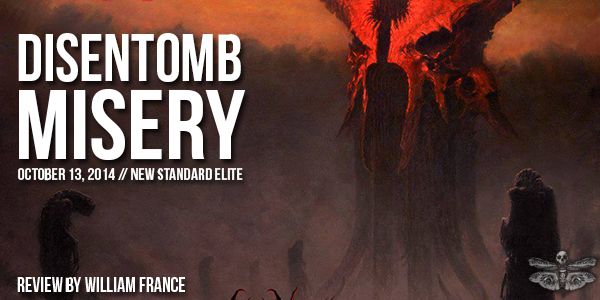
Every now and then there comes along a band who takes an idea and makes it exponentially better. For those not familiar with Disentomb, the Australian four-piece death metal band have done just that. If you could somehow mix Suffocation, Disgorge and Rivers of Nihil with Oceano and Gorguts, you would get Disentomb. The band released their debut album, The Sunken Chambers of Nephilim, four years ago. After many successful tours both throughout Australia and internationally, Misery is a testament to just how far the group has come.
The album creeps into motion with ‘The Genesis of Misery’, a track quite reminiscent of the introductory song from RoN’s ‘The Conscious Seed of Light’. From the surface of this album, the band’s influences are extremely clear. The band’s innovative composition, coupled with the remarkable production utilizes every strength of the genre and then takes it one step further. ‘The Promethean Altar’, one of the first examples where the band uses an entire song to build tension, begins with a grating dissonance baring resemblance to Gorguts’ Colored Sands. The drums are paramount to the way in which the music waxes and wanes, aiding the building discomfort and providing a contrast to the low tuned power of the bass and guitar. Track five is introduced with what feels like an extension of the exiting riff from the previous song, helping to naturally transition into a cleverly phrased slam. This sort of inter-relationship creates a sense of lasting attraction within the listener, and is not something the band were able to demonstrate as fluently in their previous album.
Tracks nine and ten are the first songs on the album to feature high vocals, and greatly help to instate in the listener just how capable a vocalist Jord is. The same rings true when remarking on the record’s guitar work. There is a hauntingly dissonant riff in the last song, ‘Sentinals of the Bleak’ that is very much something you would expect to hear from Vildhjarta. Much like the high vocals, this is one of the only songs that features this kind of composition. The way these aspects are implemented so sparecely throughout the album provides each track with an element of character, making the songs, and the last third of the album in particular, stand out. Some people may be put off or disappointed by the untraditionally crisp production, however this is the album’s greatest strength. At times, the vocals are so gutteral and percussive that they sift into the background and the focus changes to emphasise the instrumental work. Without the modern production, these dynamic values would have been all but lost in amongst the surrounding chaos.
Disentomb have created a perfect balance of lisentability and brutality. Miles ahead of Sunken Chambers of Nephilim, Misery simply feels like more. Not only is the album slightly longer, but the sheer density and freshness of the composition provides a near-endless amount of replay value.
Disentomb’s Misery gets…

4/5
-WF